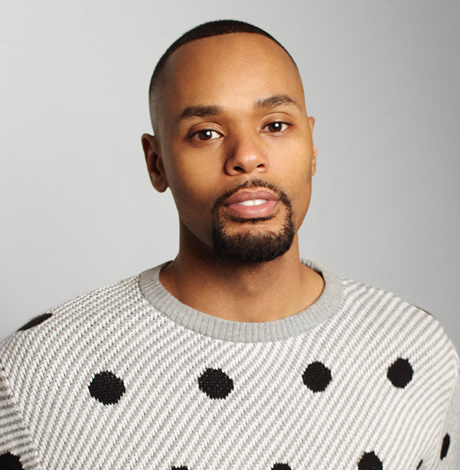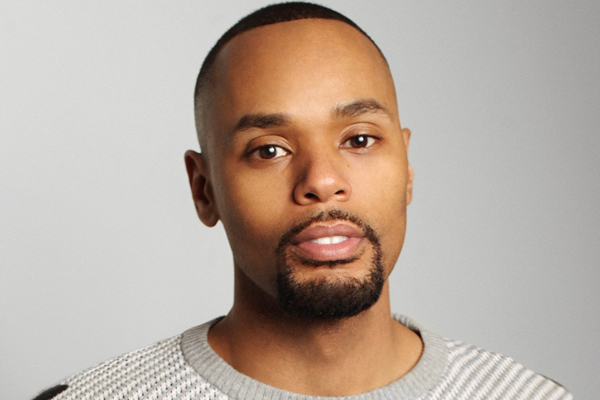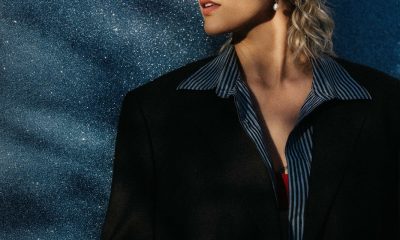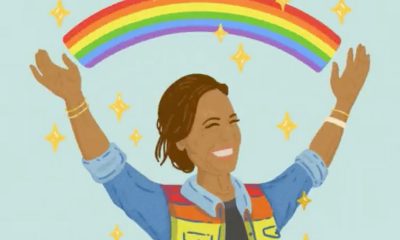Books
New Arceneaux essay collection finds humor in autobiography
Houston-born writer recalls childhood, Beyonce, Jesus and more


Michael Arceneaux brings dead-pan humor and self-deprecation to his new book of essays. (Photo courtesy Atria)
‘I Can’t Date Jesus: Love, Sex, Family, Race and Other Reasons I’ve Put My Faith in Beyoncé’
By Michael Arceneaux
Atria$17
256 pages
Maybe you’re among the unenlightened. Flea-infested hookups don’t make you smile. You don’t genuflect before Beyoncé. Don’t worry. Dive into “I Can’t Date Jesus,” a debut essay collection by writer Michael Arceneaux. You’ll emerge laughing out loud at post-hookup fleas and worshiping Beyoncé.
Literary mavens talk of “original,” “wryly humorous” and “insightful” authors the way politicos spit out talking points. Yet with Arceneaux, no other words will do. What else can you say when a book’s dedication alone makes you check your privilege while laughing?
“Once an old high school classmate told me … in Houston that I would end up working in Burger King,” Arceneaux writes, “because I had majored in journalism. This book is dedicated to dummies like that who don’t know when to shut the hell up.”
“Also: pay fast food workers livable wages,” he adds.
Arceneaux, born in 1984, raised in Houston and a Howard University graduate, is a black, Southern queer man. His funny, spot-on work has been published and heard widely.
Arceneaux’s bio is dizzying. He’s a regular contributor to sites from Essence to Into to the Root, and has written for publications from The New York Times to The Washington Post to Vogue to NPR’s Code Switch to Buzzfeed to Comedy Central Online. His fans enjoyed his political and pop culture commentary on his humor blog The Cynical Ones. Essence magazine called Arceneaux one of the top #BlackTwitter voices. He’s been featured on media outlets from MSNBC to NPR to BET to Viceland.
It’s no wonder that Arceneaux aficionados are happy to see “I Can’t Date Jesus,” a compilation of 17 of his essays, in a book. There’s the pleasure of not only reading his pieces in book form but of learning more about Arceneaux’s personal life. The volume is a memoir and commentary on being a black, Southern, queer, recovering Catholic chock full of biting, often hilarious takes on politics and pop culture.
Arceneaux grew up in a working-class family. His dad drank too much and abused his mom. His mother loved him, but believed that homosexuality goes against the teachings of Christianity and the church. Even at age 5, Arceneaux, though he didn’t have a name for it, knew he liked boys. When he and another little boy at the daycare center found that their tickling game is “fun,” Arceneaux got nervous. “Fun came at a price, however,” Arceneaux writes, “if you were caught.”
Once Arceneaux was caught behind the playground pulling his pants down in front of another boy (who responded in kind).
“It was like show and tell: the remix,” he writes. “I knew that I had enjoyed what I was doing, but I also knew that others — namely my parents — wouldn’t share my enthusiasm.”
At age 6, Arceneaux learned what his feelings for other boys could be called. But, it wasn’t a Mister Rogers teachable moment. His Uncle Daniel (his dad’s brother) died of AIDS. In response to Daniel’s death, his father said “Fuck that faggot.”
“That slur is what will always hit me in the pit of my stomach,” Arceneaux writes. “More important, this is how I learned how being different could lead to your demise.”
Coming out for him was a long process involving awkward attempts at sex, running away from and then greeting his Howard classmates at a gay Pride parade and Beyoncé. Why is Beyoncé his “lord and garroter?” Because, Beyoncé, who like him went to Welch Middle School in Houston, is “home” to Arceneaux.
“Beyoncé’s stance on remaining exactly as she’s always been no matter what is happening around her,” he writes, “has instilled in me the strength to remain the Gulf Coast ratchet bird I am.”
Arceneaux writes about the personal and the political — from racism to marriage equality to Madonna to Donald J. Trump — with David Sedaris’ blend of humor and pathos and James Baldwin’s dazzling, lacerating honesty. Woe to any white editor who tries to box him into writing about “black homophobia, AIDS, sexual racism.”
You leave “I Can’t Date Jesus” wanting more and that’s a good thing.
Books
New book explores homosexuality in ancient cultures
‘Queer Thing About Sin’ explains impact of religious credo in Greece, Rome

‘The Queer Thing About Sin’
By Harry Tanner
c.2025, Bloomsbury
$28/259 pages
Nobody likes you very much.
That’s how it seems sometimes, doesn’t it? Nobody wants to see you around, they don’t want to hear your voice, they can’t stand the thought of your existence and they’d really rather you just go away. It’s infuriating, and in the new book “The Queer Thing About Sin” by Harry Tanner, you’ll see how we got to this point.
When he was a teenager, Harry Tanner says that he thought he “was going to hell.”
For years, he’d been attracted to men and he prayed that it would stop. He asked for help from a lay minister who offered Tanner websites meant to repress his urges, but they weren’t the panacea Tanner hoped for. It wasn’t until he went to college that he found the answers he needed and “stopped fearing God’s retribution.”
Being gay wasn’t a sin. Not ever, but he “still wanted to know why Western culture believed it was for so long.”
Historically, many believe that older men were sexual “mentors” for teenage boys, but Tanner says that in ancient Greece and Rome, same-sex relationships were common between male partners of equal age and between differently-aged pairs, alike. Clarity comes by understanding relationships between husbands and wives then, and careful translation of the word “boy,” to show that age wasn’t a factor, but superiority and inferiority were.
In ancient Athens, queer love was considered to be “noble” but after the Persians sacked Athens, sex between men instead became an acceptable act of aggression aimed at conquered enemies. Raping a male prisoner was encouraged but, “Gay men became symbols of a depraved lack of self-control and abstinence.”
Later Greeks believed that men could turn into women “if they weren’t sufficiently virile.” Biblical interpretations point to more conflict; Leviticus specifically bans queer sex but “the Sumerians actively encouraged it.” The Egyptians hated it, but “there are sporadic clues that same-sex partners lived together in ancient Egypt.”
Says Tanner, “all is not what it seems.”
So you say you’re not really into ancient history. If it’s not your thing, then “The Queer Thing About Sin” won’t be, either.
Just know that if you skip this book, you’re missing out on the kind of excitement you get from reading mythology, but what’s here is true, and a much wider view than mere folklore. Author Harry Tanner invites readers to go deep inside philosophy, religion, and ancient culture, but the information he brings is not dry. No, there are major battles brought to life here, vanquished enemies and death – but also love, acceptance, even encouragement that the citizens of yore in many societies embraced and enjoyed. Tanner explains carefully how religious credo tied in with homosexuality (or didn’t) and he brings readers up to speed through recent times.
While this is not a breezy vacation read or a curl-up-with-a-blanket kind of book, “The Queer Thing About Sin” is absolutely worth spending time with. If you’re a thinking person and can give yourself a chance to ponder, you’ll like it very much.
Books
‘The Director’ highlights film director who collaborated with Hitler
But new book omits gay characters, themes from Weimar era

‘The Director’
By Daniel Kehlmann
Summit Books, 2025
Garbo to Goebbels, Daniel Kehlmann’s historical novel “The Director” is the story of Austrian film director G.W. Pabst (1885-1967) and his descent down a crooked staircase of ambition into collaboration with Adolph Hitler’s film industry and its Minister of Propaganda Joseph Goebbels. Kehlmann’s historical fiction is rooted in the world of Weimar German filmmaking and Nazi “Aryan” cinema, but it is a searing story for our challenging time as well.

Pabst was a legendary silent film director from the Weimar Republic’s Golden Era of filmmaking. He “discovered” Greta Garbo; directed silent screen star Louise Brooks; worked with Hitler’s favored director Leni Riefenstahl (“Triumph of the Will”); was a close friend of Fritz Lang (“Metropolis”); and lived in Hollywood among the refugee German film community, poolside with Billy Wilder (“Some Like it Hot”) and Fred Zinnemann (“High Noon”) — both of whose families perished in the Holocaust.
Yet, Pabst left the safety of a life and career in Los Angeles and returned to Nazi Germany in pursuit of his former glory. He felt the studios were giving him terrible scripts and not permitting him to cast his films as he wished. Then he received a signal that he would be welcome in Nazi Germany. He was not Jewish.
Kehlmann, whose father at age 17 was sent to a concentration camp and survived, takes the reader inside each station of Pabst’s passage from Hollywood frustration to moral ruin, making the incremental compromises that collectively land him in the hellish Berlin office of Joseph Goebbels. In an unforgettably phantasmagoric scene, Goebbels triples the stakes with the aging filmmaker, “Consider what I can offer you….a concentration camp. At any time. No problem,” he says. “Or what else…anything you want. Any budget, any actor. Any film you want to make.” Startled, paralyzed and seduced by the horror of such an offer, Pabst accepts not with a signature but a salute: “Heil Hitler,” rises Pabst. He’s in.
The novel develops the disgusting world of compromise and collaboration when Pabst is called in to co-direct a schlock feature with Hitler’s cinematic soulmate Riefenstahl. Riefenstahl, the “Directress” is making a film based on the Fuhrer’s favorite opera. She is beautiful, electric and beyond weird playing a Spanish dancer who mesmerizes the rustic Austrian locals with her exotic moves. The problem is scores of extras will be needed to surround and desire Fraulein Riefenstahl. Mysteriously, the “extras” arrive surprising Pabst who wonders where she had gotten so many young men when almost everyone was on the front fighting the war. The extras were trucked in from Salzburg, he is told, “Maxglan to be precise.” He pretends not to hear. Maxglan was a forced labor camp for “racially inferior” Sinti and Roma gypsies, who will later be deported from Austria and exterminated. Pabst does not ask questions. All he wants is their faces, tight black and white shots of their manly, authentic, and hungry features. “You see everything you don’t have,” he exhorts the doomed prisoners to emote for his camera. Great art, he believes, is worth the temporal compromises and enticements that Kehlmann artfully dangles in the director’s face. And it gets worse.
One collaborates in this world with cynicism born of helpless futility. In Hollywood, Pabst was desperate to develop his own pictures and lure the star who could bless his script, one of the thousands that come their way. Such was Greta Garbo, “the most beautiful woman in the world” she was called after being filmed by Pabst in the 1920s. He shot her close-ups in slow motion to make her look even more gorgeous and ethereal. Garbo loved Pabst and owed him much, but Kehlmann writes, “Excessive beauty was hard to bear, it burned something in the people around it, it was like a curse.”
Garbo imagined what it would be like to be “a God or archangel and constantly feel the prayers rising from the depths. There were so many, there was nothing to do but ignore them all.” Fred Zinnemann, later to direct “High Noon”, explains to his poolside guest, “Life here (in Hollywood) is very good if you learn the game. We escaped hell, we ought to be rejoicing all day long, but instead we feel sorry for ourselves because we have to make westerns even though we are allergic to horses.”
The texture of history in the novel is rich. So, it was disappointing and puzzling there was not an original gay character, a “degenerate” according to Nazi propaganda, portrayed in Pabst’s theater or filmmaking circles. From Hollywood to Berlin to Vienna, it would have been easy to bring a sexual minority to life on the set. Sexual minorities and gender ambiguity were widely presented in Weimar films. Indeed, in one of Pabst’s films “Pandora’s Box” starring Louise Brooks there was a lesbian subplot. In 1933, when thousands of books written by, and about homosexuals, were looted and thrown onto a Berlin bonfire, Goebbels proclaimed, “No to decadence and moral corruption!” The Pabst era has been de-gayed in “The Director.”
“He had to make films,” Kehlmann cuts to the chase with G.W. Pabst. “There was nothing else he wanted, nothing more important.” Pabst’s long road of compromise, collaboration and moral ruin was traveled in small steps. In a recent interview Kehlmann says the lesson is to “not compromise early when you still have the opportunity to say ‘no.’” Pabst, the director, believed his art would save him. This novel does that in a dark way.
(Charles Francis is President of the Mattachine Society of Washington, D.C., and author of “Archive Activism: Memoir of a ‘Uniquely Nasty’ Journey.”)
The Blade may receive commissions from qualifying purchases made via this post.
Books
‘The Vampire Chronicles’ inspire LGBTQ people around the world
AMC’s ‘Interview with the Vampire’ has brought feelings back to live

Four kids pedaled furiously, their bicycles wobbling over cracked pavement and uneven curbs. Laughter and shouted arguments about which mystical creature could beat which echoed down the quiet street. They carried backpacks stuffed with well-worn paperbacks — comic books and fantasy novels — each child lost in a private world of monsters, magic, and secret codes. The air hummed with the kind of adventure that exists only at the edge of imagination, shaped by an imaginary world created in another part of the planet.
This is not a description of “Stranger Things,” nor of an American suburb in the 1980s. This is a small Russian village in the early 2000s — a place without paved roads, where most houses had no running water or central heating — where I spent every summer of my childhood. Those kids were my friends, and the world we were obsessed with was “The Vampire Chronicles” by Anne Rice.
We didn’t yet know that one of us would soon come out as openly bi, or that another — me — would become an LGBTQ activist. We were reading our first queer story in Anne Rice’s books. My first queer story. It felt wrong. And it felt extremely right. I haven’t accepted that I’m queer yet, but the easiness queerness was discussed in books helped.
Now, with AMC’s “Interview with the Vampire,” starring Jacob Anderson as Louis de Pointe du Lac — a visibly human, openly queer, aching vampire — and Sam Reid as Lestat de Lioncourt, something old has stirred back to life. Louis remains haunted by what he is and what he has done. Lestat, meanwhile, is neither hero nor villain. He desires without apology, and survives without shame.
I remember my bi friend — who was struggling with a difficult family — identifying with Lestat. Long before she came out, I already saw her queerness reflected there. “The Vampire Chronicles” allowed both of us to come out, at least to each other, with surprising ease despite the queerphobic environment.
While watching — and rewatching — the series over this winter holiday, I kept thinking about what this story has meant, and still means, for queer youth and queer people worldwide. Once again, this is not just about “the West.” I read comments from queer Ukrainian teenagers living under bombardment, finding joy in the show. I saw Russian fans furious at the absurdly censored translation by Amediateca, which rendered “boyfriend” as “friend” or even “pal,” turning the central relationship between two queer vampires into near-comic nonsense. Mentions of Putin were also erased from the modern adaptation — part of a broader Russian effort to eliminate queer visibility and political critique altogether.
And yet, fans persist to know the real story. Even those outside the LGBTQ community search for uncensored translations or watch with subtitles. A new generation of Eastern European queers is finding itself through this series.
It made me reflect on the role of mass culture — especially American mass culture — globally. I use Ukraine and Russia as examples because I’m from Ukraine, spent much of my childhood and adolescence in Russia, and speak both languages. But the impact is clearly broader. The evolution of mass culture changes the world, and in the context of queer history, “Interview with the Vampire” is one of the brightest examples — precisely because of its international reach and because it was never marketed as “gay literature,” but as gothic horror for a general audience.
With AMC now producing a third season, “The Vampire Lestat,” I’ve seen renewed speculation about Lestat’s queerness and debates about how explicitly the show portrays same-sex relationships. In the books, vampires cannot have sex in a “traditional” way, but that never stopped Anne Rice from depicting deeply homoromantic relationships, charged with unmistakable homoerotic tension. This is, after all, a story about two men who “adopt” a child and form a de facto queer family. And this is just the first book — in later novels we see a lot of openly queer couples and relationships.
The first novel, “Interview with the Vampire” was published in 1976, so the absence of explicit gay sex scenes is unsurprising. Later, Anne Rice — who identified as queer — described herself as lacking a sense of gender, seeing herself as a gay man and viewing the world in a “bisexual way.” She openly confirmed that all her vampires are bisexual: a benefit of the Dark Gift, where gender becomes irrelevant.
This is why her work resonates so powerfully with queer readers worldwide, and why so many recognize themselves in her vampires. For many young people I know from Eastern Europe, “Interview with the Vampire” was the first book in which they ever encountered a same-sex relationship.
But the true power of this universe lies in the fact that it was not created only for queer audiences. I know conservative Muslims with deeply traditional views who loved “The Vampire Chronicles” as teenagers. I know straight Western couples who did too. Even people who initially found same-sex relationships unsettling often became more tolerant after reading the books, watching the movie or the show. It is harder to hate someone who reminds you of a beloved character.
That is the strength of the story: it was never framed as explicitly queer or purely romantic, gothic and geeky audiences love it. “The Vampire Chronicles” are not a cure for queerphobia, but they are a powerful tool for making queerness more accessible. Popular culture offers a window into queer lives — and the broader that window, the more powerful it becomes.
Other examples include Will from “Stranger Things,” Ellie and Dina from “The Last of Us” (both the game and the series), or even the less mainstream but influential sci-fi show “Severance.” These stories allow audiences around the world to see queer people beyond stereotypes. That is the power of representation — not just for queer people themselves, but for society as a whole. It makes queer people look like real people, even when they are controversial blood-drinkers with fangs, or two girls surviving a fungal apocalypse.
Mass culture is a universal language, spoken worldwide. And that is precisely why censorship so often tries — and fails — to silence it.
-

 National5 days ago
National5 days agoTrump falsely links trans people to terrorism
-

 Virginia5 days ago
Virginia5 days agoFellow lawmakers praise Adam Ebbin after Va. Senate farewell address
-

 National5 days ago
National5 days agoLGBTQ activists mourn the Rev. Jesse Jackson
-

 Massachusetts4 days ago
Massachusetts4 days agoEXCLUSIVE: Markey says transgender rights fight is ‘next frontier’




















